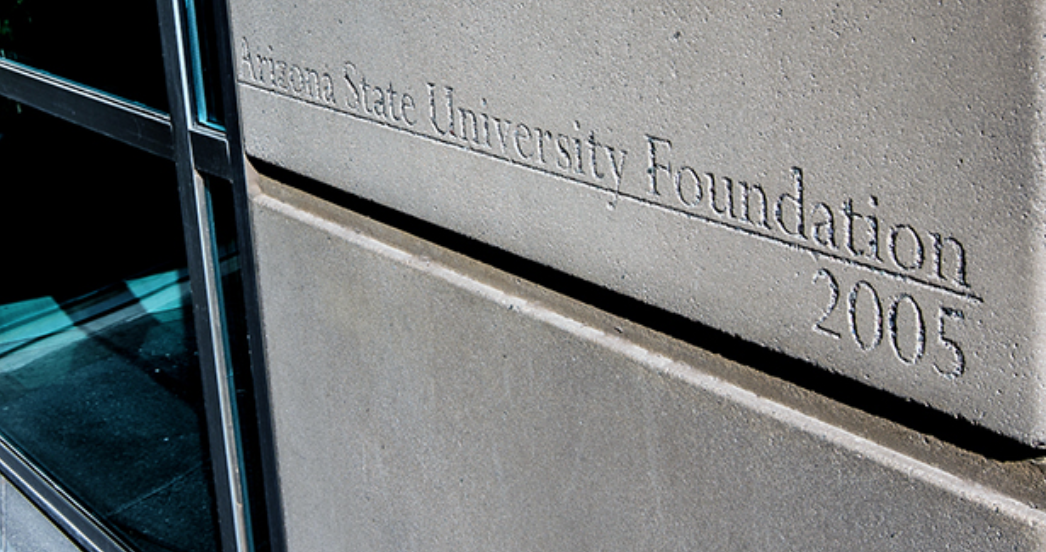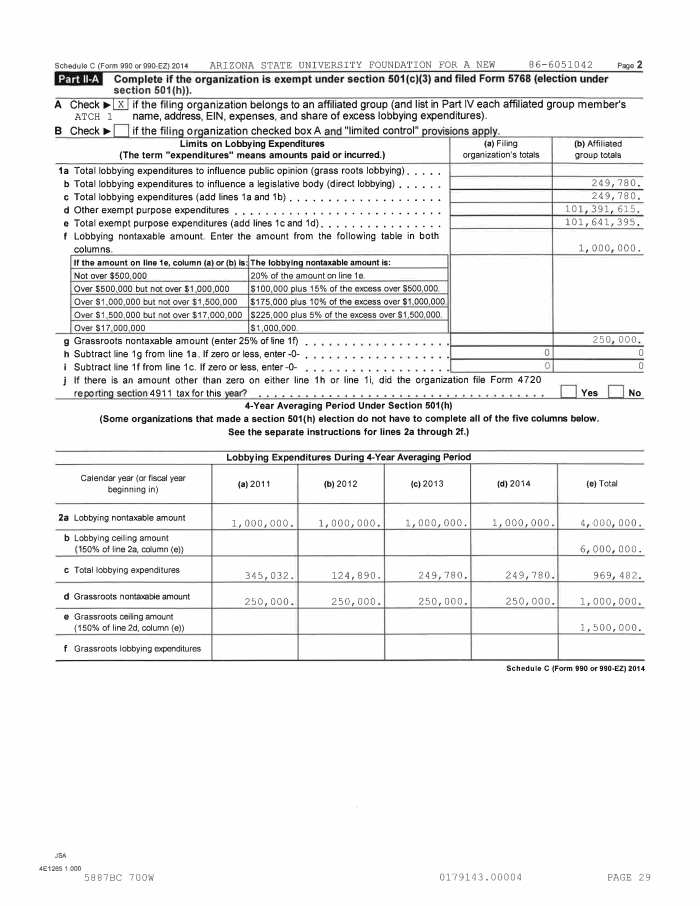By: Charles T. Clark Arizona Center for Investigative Reporting July 5, 2017 , 3:04 pm
(Note: This story comes from the Arizona Center for Investigative Reporting through a Creative Commons license. AZCIR is a nonprofit investigative newsroom.)
Over the past decade the ASU Foundation for a New American University, the nonprofit fundraising arm of Arizona State University, has brought in revenues upwards of $100 million per year and given more than $60 million in grants annually back to the university.
Incorporated in 1955, the foundation was envisioned as a way to support Arizona’s fastest-growing university. And throughout the years as ASU has grown, the foundation has become a crucial piece of university operations, offering support through a variety means including philanthropy, research funding and partnerships and investment.
In 2016, ASU Foundation was reorganized as a conglomerate of nonprofits known as ASU Enterprise Partners.
But while the foundation receives high marks from charity watchdog organizations for directing above-average portions of revenue to program services, experts in nonprofits say there are some oddities contained in ASU Foundation’s tax filings.
Following the publication of a 2008 report questioning whether Sybil Francis, the wife of ASU President Michael Crow, should have been employed by the foundation, Crow disappeared from the foundation’s list of board members in its tax filings for four of the next six years. Likewise, Francis no longer was reported as one of the organization’s highest-paid employees.
In subsequent years, Crow returned as a board member and Francis is again listed as receiving a salary.
In an emailed statement that a spokeswoman said could be attributed only to the ASU Foundation, the organization said Crow and Francis’ exclusion from the tax filings was inadvertent and blamed the errors on its accountant. Crow has been a voting board member since 2002, when he became president of Arizona State University, the foundation said in a written statement.
ASU Foundation has also spent exorbitantly on lobbying efforts, though it is unclear what changes in public policy they have sought. Public records indicate the organization has only recently hired lobbyists to represent it at the state Capitol, and its real-estate-investment subsidiary has a lobbyist to deal with matters in Tempe, where it is located.
The foundation said the money categorized as lobbying on federal tax forms wasn’t spent to directly influence elected officials, but was instead aimed at awareness campaigns intended to boost public support of education initiatives the foundation and ASU supported.
ASU Foundation officials would not agree to be interviewed on the record in response to the questions AZCIR had after reviewing the organization’s tax filings for the past decade.
Since 2012, ASU Foundation has paid Francis more than $830,000 for her work, but chosen to disclose her salary in an obscure section of the tax return that details payments to people with ties to board members instead of listing her among the organization’s highest-paid employees.
Eric Gorovitz, a principal attorney at Adler & Colvin, a San Francisco-based law firm that advises nonprofit organizations, characterized that as “odd,” and said it is concerning that the foundation would not be more explicit about the money it pays to the wife of the university president, who also sits on the board.
On the tax returns for the years 2012 to 2016, Francis is listed in a section near the end of the return that outlines business transactions with interested persons, and it is stated that her compensation is for employment. In all, she was paid $834,533 during that time.
Given that her annual compensation averages about $166,000, Gorovitz said she would likely be one of the top 20 highest paid employees or highest paid contractors, which are disclosed in a more prominent place near the beginning of the tax return.
“It might just be an optics problem,” Gorvitz said. “But I do get worried when they present it in this way.”
According to Francis’s LinkedIn profile, she is ASU Foundation’s director for strategic advancement, and has been an employee since 2002. ASU Foundation said Francis has been paid to be the executive director of Center for the Future of Arizona, a nonprofit founded by former ASU President Lattie Coor, since 2003.
However, Francis is not listed anywhere on the organization’s tax returns between 2010 and 2012. This coincides with both changes to IRS nonprofit reporting requirements in 2008 and to backlash ASU Foundation received in 2008 over Francis’ employment.
In 2008, a report by the Coalition for Justice at Great Western Erectors questioned whether Francis should be employed by the foundation because her husband served on the board of directors.
In its 2005-2006 tax return, ASU Foundation reported that Francis was being compensated $160,000 for working 65 hours a week at the foundation as a “senior adviser.”
The 65 hours a week was in spite of the fact that she was (and still is) the executive director for Center for the Future of Arizona. According to that organization’s tax returns during 2005 and 2006, she was being paid $114,000 for working “as required.”
Although Francis’s current biography listed on the Center for the Future of Arizona’s website states she “is engaged in all aspects of the center’s work,” and her LinkedIn profile says she has been executive director of the organization since 2002, she has not been listed as a salaried employee in Center for the Future of Arizona’s tax returns since 2009.
In response to the 2008 report, ASU Foundation’s then-president and CEO, Johnnie Ray, told The Arizona Republic that Francis’ salary was justified because “spouses of all university presidents spend an enormous amount of time promoting the university’s interests.”
“There are some universities that choose to pay spouses of presidents as employees and some who do not,” Ray told the Republic. “We are one who chooses to pay because we believe that service has a huge return on that investment.”
About two months after the controversy from the Coalition for Justice at Great Western Erectors report and the subsequent media coverage, ASU Foundation filed its tax return for 2006-07. Crow was no longer listed as a member of the board of directors and Francis, who was previously mentioned among the highest paid employees, was also absent.
For the next two years, Crow and Francis were listed in the tax returns with Crow on the board and Francis as working 40 hours a week as a “special advisor,” receiving about $175,000 in compensation. She was one of the organization’s five highest-paid employees.
But Crow and Francis disappeared from the reports again for two years, beginning in 2009-10. They then both reappeared in the ASU Foundation’s 2012-13 filing, with Crow again listed on the board of directors, but Francis now listed under a section that outlines business with interested persons instead of as a top-paid employee. Both have been in the same sections ever since.
In a written statement, ASU Foundation said it believes that its organizational materials and tax forms have been clear about the roles played by Crow and Francis, though it conceded that both were erroneously missing from some tax filings.
“In cases where past IRS Form 990s do not describe these roles in a consistent manner, the organization will work with its accounting team to publicly disclose related information and amend it where applicable,” the organization said.
ASU Foundation did not answer specific questions relating to the errors, the changes in how Francis’ employment was disclosed or why the explanation for Francis’ salary was different in 2008 than it is now.
AZCIR’s review of ASU Foundation’s tax filings also found that its lobbying expenses are several times greater than those made by other public university foundations and there are few records indicating who had been hired to lobby during that period, who the target of the influence was and on what matters.
In the last five years, ASU Foundation has spent nearly $1.4 million on lobbying activities, topping out at $424,780 in 2015-2016.
By law, that it is perfectly justifiable, said Gorovitz, the San Francisco attorney who advises nonprofits, because it is allowed to spend up to $1 million on lobbying annually.
On its tax returns, ASU Foundation states that it engages in lobbying practices that “contribute to public communication and advocacy activities that support higher education in Arizona and the need for adequate funding to provide excellent educational opportunities for Arizona residents.”
However, there are scant records indicating who ASU Foundation paid to lobby on its behalf, who was lobbied and what was lobbied for.
Federal lobbying records maintained by the U.S. Senate and the U.S. House of Representatives show that ASU Foundation has not lobbied in Congress. State records show that ASU Foundation did not begin lobbying state legislators until February of this year, when it hired the public affairs firm Veridus to represent it at the State Capitol.
Veridus partner Wendy Briggs would not comment on her firm’s work and referred all questions to the ASU Foundation. However, legislative records show that the only bill ASU Enterprise Partners took a position on, via Briggs, was a budget bill that provided the universities with infrastructure funding.
And lobbying records in Tempe, where ASU Foundation is located, show that Phoenix law firm Gammage & Burnham has represented the foundation’s real estate affiliate, University Realty, since at least the beginning of this year, when the city began requiring lobbyists to register and disclose their clients.
Gammage & Burnham attorney Manjula Vaz said she represents University Realty on land use matters before the Tempe City Council. She said the firm only recently began representing the organization before the Tempe City Council, though Gammage & Burnham has served as University Realty’s real estate attorneys for several years.
The foundation’s lobbying activities also stand in stark contrast to other university foundations.
In 2015-16, ASU Foundation received more than $128 million in revenue and spent nearly $424,780 on lobbying activities. By comparison Northern Arizona University’s foundation spent nothing on lobbying during that period and the University of Arizona Foundation, which also received more than $110 million in revenue, spent only $79,200 on lobbying.
According to its tax filing, The University of Arizona Foundation’s lobbying efforts involved contributing $75,000 to the ballot campaign supporting Proposition 123 in 2016. The measure, which was approved by voters a year ago, increases K-12 education funding for the next decade.
Furthermore, over the five years in which ASU Foundation spent nearly $1.4 million on lobbying activities, the University of Arizona Foundation spent less than $300,000.
Compared to foundations for other public universities with comparable enrollment figures, ASU Foundation’s lobbying efforts are also on the high end, though the amount spent on lobbying by those foundations varies widely.
Of the foundations representing the five largest public universities in the country, only Florida International University, with a little less than $2 million, spent more on lobbying activities from 2010-2015.
During that period the ASU Foundation spent spent $969,482 on lobbying activities, which is more than the foundations representing Ohio State University, the University of Florida, Texas A&M University, and the University of Central Florida spent on lobbying activities combined. Those foundations combined spent $856,760 on lobbying activities during those five years.
ASU Foundation said its lobbying expenses are actually public education efforts on policy issues, which, under federal tax rules, are classified as lobbying expenses.
The organization “engages advocacy tools to increase understanding, awareness and support for its mission,” including to build support for public transportation between ASU’s metro Phoenix campuses, for policies that would better prepare Arizona students for college and for public investment in Arizona universities.

































